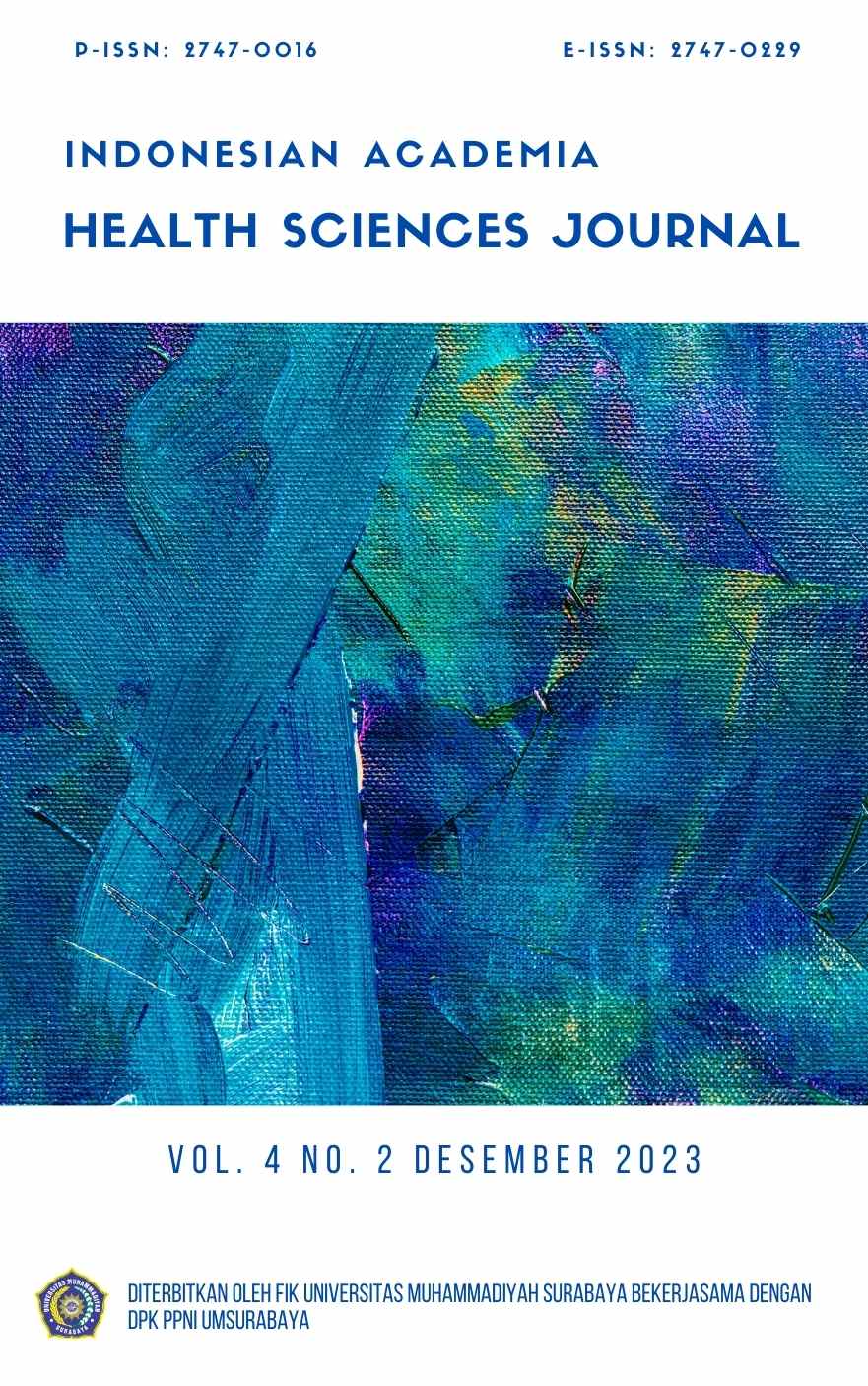Karakteristik Keluarga Balita dan Status Gizi Balita dengan Pneumonia di Puskesmas Moncek Kabupaten Sumenep
Abstract
Background: Golden period is the peak period of child growth and development. Growth and development of toddlers need to be monitored regularly in order to produce quality human resources. At that age, a problem that is commonly called the Triple M Complex (Malnutrition - Morbidity - Mortality) can be found. Pneumonia is the main killer of children under five in the world. One of the growth indicators for toddlers is nutritional status. Nutritional status can be monitored using KMS. The high number of pneumonia cases in Indonesia is not only a disease problem but also related to behavior. Protection and prevention efforts must be followed by changes in the behavior of those closest to the child, especially parents. Parental behavior is influenced by many factors, such as education, age, occupation, parental marital status.
Aims: . to determine the characteristics of families of toddlers with pneumonia and the nutritional status of toddlers with pneumonia at the Moncek Health Center, Sumenep Regency
Methods: cross sectional analytic study with a purposive sampling technique
Results: From this study it was found that the percentage of female respondents was higher (96.7%) than male respondents (3.3%) as a parents.The most age of responden is 15-44 years (66,7%), almost all respondents were married as many as 27 people (90%). Characteristics of respondents based on education level is that most of them have elementary school education (33.3%) and most of them don’t go to work (33,3%). And from 30 toddler who get pneumonia are in negative growth nutritional status (100%).
Conclusion: The nutritional status of children with pneumonia if based on the Towards Health Card (KMS) tends to "grow negative", that is, the body weight has decreased compared to the previous month's weight. Characteristics of families in toddlers with pneumonia are mostly of childbearing age, with female sex and most are housewives (not working) and almost half of them were elementary school graduates.
Â
Full text article
References
Alam, N. H., Faruque, A. S., Ashraf, H., Chisti, M. J., Ahmed, T., Sultana, M., Khalequzzaman, M., Ali, S., Ahmed, S., Nasrin, S., Tariqujjaman, M., Haque, K. A. T. M. E., Amin, R., Mollah, A. H., Kabir, L., Shahidullah, M., Khanam, W., Islam, K., Kim, M., Fuchs, G. J. (2023). Effectiveness, safety and economic viability of daycare versus usual hospital care management of severe pneumonia with or without malnutrition in children using the existing health system of Bangladesh: a cluster randomised controlled trial. EClinicalMedicine, 60, 102023. https://doi.org/10.1016/j.eclinm.2023.102023
Alvionita, V., Sulfatimah, S., Astuti, A., & Nurfitri, N. (2022). Hubungan Status Gizi Dan Status Imunisasi Dengan Kejadian Pneumonia Pada Bayi. Ahmar Metastasis Health Journal, 1(4), 137–143. https://doi.org/10.53770/amhj.v1i4.92
Arny, Putri, L. A. R., & Abadi, E. (2020). Hubungan Status Gizi dan Paparan Asap Rokok dengan Kejadian Pneumonia pada Balita di Wilayah Kerja Puskesmas Tinanggea. Jurnal Kesehatan Masyarkat, 10(1), 73–77. http://jurnal.unismuhpalu.ac.id/index.php/PJKM/article/view/1215
Forh, G., Apprey, C., & Frimpomaa Agyapong, N. A. (2022). Nutritional knowledge and practices of mothers/caregivers and its impact on the nutritional status of children 6–59 months in Sefwi Wiawso Municipality, Western-North Region, Ghana. Heliyon, 8(12), e12330. https://doi.org/10.1016/j.heliyon.2022.e12330
Mading, M., & Ni Wayan Dewi Adyana, dan. (2014). Status Gizi dan Imunisasi Sebagai Determinan Kejadian Pneumonia Balita di Provinsi Nusa Tenggara Timur. Buletin Penelitian Sistem Kesehatan Kemenkes RI, 407–414. http://www.google.co.in/search?site=&sourc
Novarianti, W., Syukri, M., Izhar, M. D., Ridwan, M., & Faisal, F. (2021). Status Gizi dan Pemberian Kapsul Vitamin A sebagai Faktor Risiko Pneumonia Balita Usia 18-59 Bulan. Jurnal Bidan Cerdas, 3(2), 47–54. https://doi.org/10.33860/jbc.v3i2.418
Nurnajiah, M., Rusdi, R., & Desmawati, D. (2016). Hubungan Status Gizi dengan Derajat Pneumonia pada Balita di RS. Dr. M. Djamil Padang. Jurnal Kesehatan Andalas, 5(1), 250–255. https://doi.org/10.25077/jka.v5i1.478
Piliang, N. S., & Filda, M. (2018). Hubungan Status Gizi Dengan Pneumonia Balita Di Puskesmas Umban Sari Pekanbaru Tahun 2016. Jurnal Endurance, 3(2), 325. https://doi.org/10.22216/jen.v3i2.2837
R. Andriyani, O. D. R. (2019). Hubungan Status Imunisasi, Asi Ekslusif, Dan Status Gizi Dengan Kejadian Pneumonia Pada Balita Di Puskesmas Rejosari. Journal of Chemical Information and Modeling, 53(9), 1689–1699.
Rahmawati, L. (2016). Hubungan Status Gizi dengan Kejadian Pneumonia Pada Anak Balita. X(65), 40–45.
Rigustia, R., Zeffira, L., & Vani, A. T. (2019). Faktor Risiko yang Berhubungan dengan Kejadian Pneumonia pada Balita di Puskesmas Ikur Koto Kota Padang. Health & Medical Journal, 1(1), 22–29. https://doi.org/10.33854/heme.v1i1.215
Tang, W., 1, Shao, X., Chen, Q., Zhu, L., He, Y., Lu., E. (2019). Nutritional status of protein intake in severe pneumonia patients based on dietary nutrition information system. Journal of Infection and Public Health 14 (2021) 66–70. https://doi.org/10.1016/j.jiph.2019.07.016
Tewabe, T., & Belachew, A. (2020). Determinants of Nutritional Status in School-Aged Children in Mecha, Northwest Ethiopia. Current Therapeutic Research - Clinical and Experimental, 93, 100598. https://doi.org/10.1016/j.curtheres.2020.100598
Ulfa, S. R. (2020). Hubungan Status Gizi Dengan Derajat Keparahan Pneumonia Balita Di Rsud Zainoel Abidin Banda Aceh Tahun 2019 Oleh :
Wahl, B., Knoll, M. D., Shet, A., Gupta, M., Kumar, R., Liu, L., Chu, Y., Sauer, M., O’Brien, K. L., Santosham, M., Black, R. E., Campbell, H., Nair, H., & McAllister, D. A. (2020). National, regional, and state-level pneumonia and severe pneumonia morbidity in children in India: modelled estimates for 2000 and 2015. The Lancet Child and Adolescent Health, 4(9), 678–687. https://doi.org/10.1016/S2352-4642(20)30129-2
Authors
Copyright (c) 2024 Rasyidah Rasyidah

This work is licensed under a Creative Commons Attribution-NonCommercial-NoDerivatives 4.0 International License.

